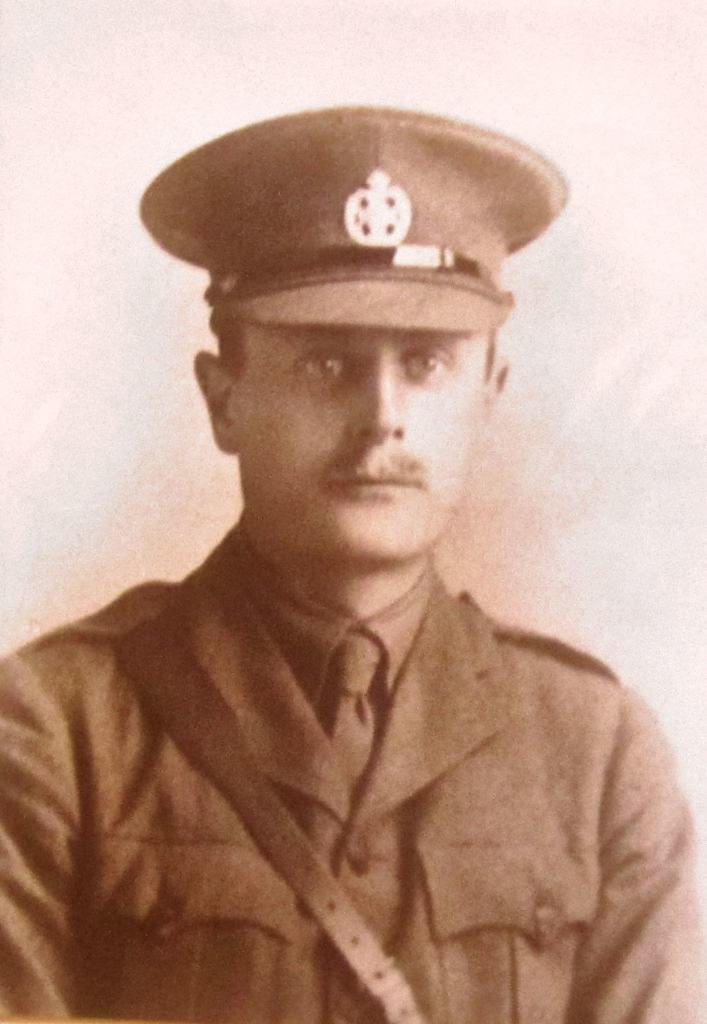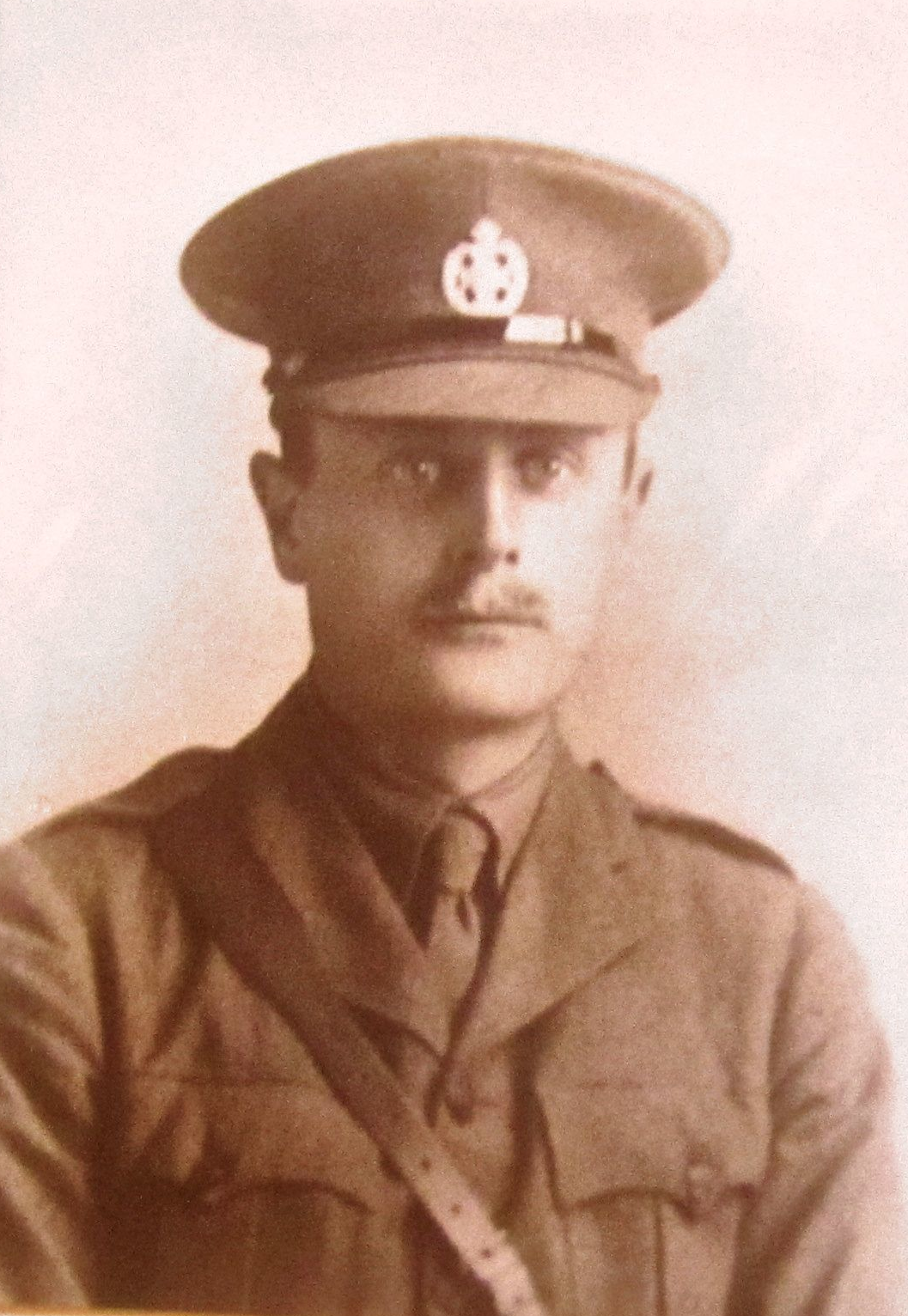Fact file:
Matriculated: 1900
Born: 22 November 1881
Died: 22 May 1916
Regiment: London Regiment (Post Office Rifles)
Grave/Memorial: Arras Memorial: Bay 10.
Family background
b. in Campden Hill, London, on 22 November 1881 as the second son (of five children) of George Edgar Frere (b. 1845 in Cape Town, South Africa, d. 1908) and Adelaide Mary Frere (née Back) (1850–1928) (m. 1872). At the time of the 1891 Census the family was living at The Camels, Princess Road, Wandsworth (six servants); at the time of the 1901 Census it was living at 41, Hyde Park Square, London W2 (six servants, including a butler); it subsequently lived at Woodfield, Lytton Grove, Putney Hill. After Frere’s death, his mother lived at The Brown House, Old Bexhill, Sussex, then The Croft, Manor Road, Bexhill, Sussex.
Frere’s father was a solicitor and the son of George Frere, FRGS (1810–78), a lawyer who had worked for the Foreign Office in South Africa as a member of HM Slave Commission, a body involved in the suppression of slavery. Like H.L. Cholmeley’s father, he was a partner of Frere, Cholmeley & Co., of 28, Lincoln’s Inn Fields, London WC.
Frere’s mother was the daughter of the Reverend James Back (1815–74) who was Chaplain of the Cemetery of St George, Hanover Square, London.
Frere’s grandfather was a cousin of Sir Henry Bartle Frere (1815–84), a colonial administrator who had distinguished himself in India from 1835 to 1872, but who had a less successful career in South Africa. He was High Commissioner there from 1877 to 1879 and is generally credited with initiating the war against the Zulu King Cetshwayo (1826–84; reigned 1872–79) which issued in the military disaster at Isandlwana on 25 January 1879.
Siblings and their families
Brother of:
(1) Edith Mary (1873–97);
(2) George (1874–87);
(3) Grace (1876–1948); later Sanger after her marriage in 1911 to George John Sanger (1869–1923);
(4) Violet (1878–1955); later Everington after her marriage in 1900 to Edgar Everington (1870–1944), a solicitor’s clerk who later became a solicitor; three daughters.
Education and professional life
Frere attended Lockers’ Park Preparatory School, Hemel Hempstead, Hertfordshire (founded 1874) from 1894 to 1895, and then Eton College from 1895 to 1900, where he served in the Eton College Rifle Volunteers and “was a keen wet-bob and rowed in the Alexandra”. He matriculated at Magdalen as a Commoner on 15 October 1900, having passed Responsions in Hilary Term 1900. He passed the First Public Examination in Trinity Term 1901 and then read for a Pass Degree (Groups B3 [Elements of Political Economy], B4 [Law] and B2 [French Language], Trinity Term and Michaelmas Term 1902). He took his BA on 18 June 1903. President Warren described him posthumously as “a quiet, slightly shy fellow, he was steadfast and unselfish, and when the call came, he modestly and tacitly slipped into his place”.
After graduation, he, like his father and grandfather, became an articled clerk in the family firm mentioned above and he stayed with it until 1906. But after he had passed his examinations, his “roving spirit” became dissatisfied with the law as a profession, and he went to the colonies, earning his living as a farm labourer or mining prospector, or as anything that might turn up. Ultimately his “craving for books and pen and paper” overcame him, and he returned to England, where he led a literary life, disappearing into the country sometimes for weeks in order to read and study undisturbed. He published a semi-autobiographical novel entitled Rebels which some critics thought showed promise, and he occasionally wrote for the Westminster Gazette and Bookman. He also composed some plays, of which two – Match-making in Mayfair (Comedietta) and Pandora (a one-act Comedy of Indecision) – were performed, probably in 1912. His Eton obituarist described him as having “a peculiarly lovable character” who “had a great attraction for those few to whom he broke through his reserve”. When making his will, he gave his address as West Lodge, Eliot Vale, Blackheath, Kent.

Edgar Frere, BA
(Photo courtesy of Magdalen College, Oxford).
“A quiet, slightly shy fellow, he was steadfast and unselfish, and when the call came, he modestly and tacitly slipped into his place.”
War service
Frere was 5 foot 7½ inches tall, and during his time as an articled clerk he joined the Mounted Infantry Section of the Inns of Court Officers’ Training Corps. But on 2 September 1914 he attested and on 15 September 1914 he became a Private in the 18th (Service) Battalion of the Royal Fusiliers (1st Public Schools Battalion, City of London Regiment), giving his profession as “author”. He stayed with this Battalion until 7 June 1915 and was commissioned Second Lieutenant in the 8th (City of London) Battalion, The London Regiment (Post Office Rifles) on 10 June 1915 (London Gazette, no. 29,188, 9 June 1915, p. 5,625). The Battalion had landed at Le Havre on 18 March 1915 as part of the 4th London Brigade, the 1/2nd London Division (redesignated the 140th Brigade, 47th (London) Division, on 12 May 1915), just before the Battle of Festubert (15–24 May), when B.O. Moon was killed in action and the Battalion was reduced from 900 to 300 men. Given the date of Frere’s promotion, he almost certainly joined the Battalion in summer 1915 as part of its reinforcements.
The Battalion’s War Diary is very sketchy about the Battalion’s movements during the second half of 1915, but we know from the War Diary of the HQ of 140th Brigade that the 47th Division was positioned on the right – i.e. at the southern end – of the British line during the Battle of Loos, that on 25 September it attacked in two columns, with the 6th Londons on the right, the 7th Londons on the left, and the 8th Londons in reserve in the centre, that its objective was the Loos Double Crassier (Long Slag Heap), south-west of Loos between Grenay and Cité St Pierre, that it captured and consolidated all its assigned objectives by 08.00 hours, and that when Frere’s Battalion was relieved by the French on 28 September, it had lost eight officers and 38 other ranks killed, wounded and missing. The Battalion then spent October and November in the area of Verquin, Noeux-les-Mines and Mazingarbe, and December in the area of Lillers, Vaudricourt, Noyelles and les Vermelles.
In early January 1916 the Battalion came back to Loos where, for the next six weeks, it alternated between four days in and four days out of the trenches. On 14 February 1916 the Battalion was in Corps reserve, in the I Corps training area between Bomy and Reclinghem, 25 miles from the front line. On about 20 March it took over the Grouse Butts Sector of the line to the north-west of Vimy Ridge and south of devastated Souchez, and here, once again, it alternated between four days in the badly damaged trenches and four days in support. Then, on the afternoon of 26 April 1916, after the Battalion had spent six fairly quiet weeks in the area of Estrée-Cauchie, Gouy-Servins, Verdrel, Villiers-au-Bois and Casency, the fighting, which this time involved huge mine explosions and artillery duels, began again and continued until late May. On 19 May 140th Brigade completed its takeover of 74th Brigade’s trenches and Frere’s Battalion found itself positioned on the flat top of heavily cratered Vimy Ridge, with Zouave Valley sloping back down behind it.
On 20 May, the Battalion suffered light casualties when it was bombarded for six hours, but at 05.00 hours on the morning of 21 May the Germans began shelling again, this time to greater effect. Then, at 15.45 hours, the Battalion was exposed to a systematic box barrage that lasted for four hours and was designed to clear every trench and isolate the Battalion from its neighbours. So when, at 19.45 hours, the bombardment was extended to the communication trenches behind the Battalion in Zouave Valley, the Germans were able to overrun the Battalion’s front Companies. Frere was mortally wounded on 21 May while accompanying Captain Vince and a detail of bombers up a support trench to the top of the Ridge, in order to see what had happened to the Battalion’s Lewis (light machine-)guns, for which Frere was responsible, and clear the Germans out of a captured trench. But the Germans saw the detail coming and threw grenades at them, one of which exploding between Frere and the Battalion’s Bombing Officer, wounding them both seriously. Frere was carried out of the trench and died, aged 33, of wounds received in action a few hours later on 22 May 1916 in a Casualty Clearing Station near Vimy Ridge. His Battalion had suffered 358 casualties killed, wounded and missing, and only 120 of its members survived the fighting of 21–23 May. He has no known grave. He is commemorated on Bay 10 of the Arras Memorial. He left £1,290 2s 10d.
Bibliography
For the books and archives referred to here in short form, refer to the Slow Dusk Bibliography and Archival Sources.
Special acknowledgements:
*Messenger (1982), pp. 27–51 (esp. 48–51).
Printed sources:
[Anon.], ‘Edgar Frere’ [brief obituary], The Times, no. 41,178 (27 May 1916), p. 8.
[Anon.], ‘Edgar Frere’ [obituary], The Eton College Chronicle, no. 1,574 (22 June 1916), p. 40.
[Thomas Herbert Warren], ‘Oxford’s Sacrifice’ [obituary], The Oxford Magazine, 34, no. 21 (2 June 1916), p. 346.
Leinster-Mackay (1984), pp. 58, 169, 326.
Archival sources:
MCA: Ms. 876 (III), vol. 1.
OUA: UR 2/1/41.
WO95/2727.
WO95/2731.
WO374/25796.
Books by Edgar Frere:
–– Ann [adapted from the comedy by Lechmere Worrall] (London: no publisher, 1912).
–– Rebels [a novel] (London: Drane, 1912).
Articles by Edgar Frere:
–– ‘The Bookman Gallery: Miss Viola Meynell’, The Bookman, 46, no. 271 (April 1914), pp. 8–9.
